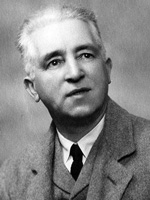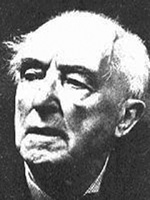Quick links
News
Ludlow Piano Festival 2024
John Dowland's Fancy at this year's Ludlow Piano Festival
13 May 2024 more…
The Cenci released
The 1997 premiere performance of The Cenci appears on Toccata Classics
13 May 2024 more…
New CD release on Heritage
Symphonies 8, 9, 22 and 24 on Heritage under Myer Fredman
13 February 2023 more…
Brian at the Proms 2022
Premiere Proms performance of Legend, given by Alina Ibragimova
27 April 2022 more…
Support us
The Havergal Brian Society
 William Havergal Brian was
born on 29 January 1876 into a working-class Potteries family in
Dresden, Staffordshire. He gained his first musical experience in
church choirs and after leaving school at the age of 12 he was in
some demand as a church organist. He learned the violin and cello,
and played in local bands and orchestras. A local teacher gave him
a thorough theoretical grounding, but he was virtually self-taught
in composition. Nevertheless he rapidly acquired an invincible
desire to be a composer and in the first decade of the twentieth
century began to make a name for himself.
William Havergal Brian was
born on 29 January 1876 into a working-class Potteries family in
Dresden, Staffordshire. He gained his first musical experience in
church choirs and after leaving school at the age of 12 he was in
some demand as a church organist. He learned the violin and cello,
and played in local bands and orchestras. A local teacher gave him
a thorough theoretical grounding, but he was virtually self-taught
in composition. Nevertheless he rapidly acquired an invincible
desire to be a composer and in the first decade of the twentieth
century began to make a name for himself.
Some of his music was admired by Elgar, works of his were performed by conductors such as Henry Wood and Thomas Beecham, and for a number of years he and his family were supported by a wealthy Staffordshire businessman so that Brian would be free to compose.
All this came to an abrupt end, however, just before the outbreak of World War 1, when various personal crises forced him to leave his home and family. In London he failed to consolidate such musical reputation as he had gained, and for many years he supported a growing second family with a series of menial jobs, often in some poverty.
By the late 1920s Brian gained an assistant editorship on the journal Musical Opinion, through which he gained a clearer understanding of and greater sympathy with the latest continental developments than almost any other British composer. The musical establishment however - with the exception of his close friend Sir Granville Bantock - passed him by and his own growing body of mature work remained almost entirely unknown and unperformed.
This – although Richard Strauss (to whom the Gothic Symphony is dedicated) took him seriously, and despite Sir Donald Tovey being moved to write in 1934 that 'even for the recognition of his smaller works he is being made to wait… far longer than is good for any country whose musical reputation is worth praying for'.
With the death of Bantock in 1946, Brian lost his last advocate for performances of his music until the early 1950s, when his work came to the attention to a young BBC music producer named Robert Simpson, himself destined to become one of Britain's foremost symphonists.
 Starting with Brian's eighth symphony in 1954 (the first time that
Brian, already 78, heard any of his symphonies), Simpson gradually
brought about over the next quarter of a century a growing number
of performances, mostly in radio broadcasts, which began to
initiate a recognition of Brian's achievement.
Starting with Brian's eighth symphony in 1954 (the first time that
Brian, already 78, heard any of his symphonies), Simpson gradually
brought about over the next quarter of a century a growing number
of performances, mostly in radio broadcasts, which began to
initiate a recognition of Brian's achievement.
The composer moved from London to Shoreham-by-Sea, Sussex, in 1958, where he embarked upon a final, immensely rich, ten-year Indian Summer of composition which included no fewer than 20 symphonies. He finally ceased original creative work in October 1968 with the completion of his 32nd Symphony, but for the remaining four years of his life he retained full mental vigour and it always seemed possible that he might return to composition.
His death came on 28 November 1972 as the result of a fall, two months short of his 97th birthday. Though he knew that the BBC was committed to broadcasting in due course all of his symphonies, not a note of his music was commercially issued on record during his lifetime, and he died without having heard many of his finest works.